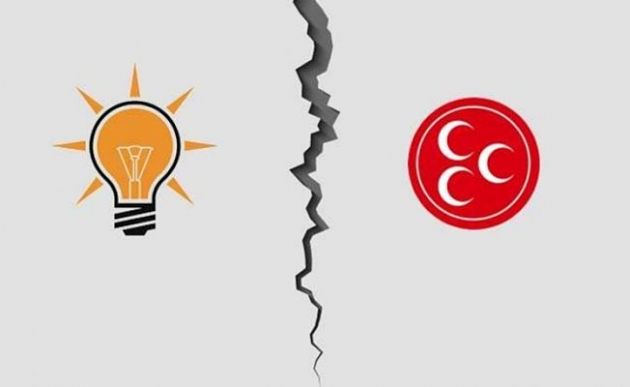Against the backdrop of the highly publicized events in Turkey related to the murder of journalist Khashoggi in the Saudi consulate, another event, possibly equally important in terms of political consequences, has gone almost unnoticed by external observers.
Devlet Bahceli, the leader of the Nationalist Movement Party (MHP), announced the dissolution of the People’s Alliance he had formed with the ruling Justice and Development Party (AKP) of President Recep Tayyip Erdogan. The reasons behind these events and their implications are questions of interest to anyone following Turkish domestic politics.
But first, let’s remember why this alliance was so important. As we wrote after the results of the recent elections, “in the ruling People’s Alliance (Chumhur Ittifaki), the conditional Islamists of the AKP have already lost their parliamentary majority, with only 42.42% of the vote, and are now dependent on the nationalists of the MHP, without whom they cannot implement their decisions”.
Therefore, a few days before Bahceli announced his decision, Ibrahim Karagul, the editor-in-chief of Yeni Şafak, a publication close to the ruling circles, warned in his article about the events in the region and the risks they pose that the dissolution of the People’s Alliance could have dramatic consequences for Turkey’s domestic and foreign policy.
So why did Devlet Bahceli, whose party was recently described as almost the second ruling party thanks to its alliance with Erdogan’s party, take this step? The reason was the incident involving prominent AKP official Bekir Bozdag, who is of Kurdish origin.
The issue arose when a group of Kurds tried to challenge the wording of the school oath, which includes the phrase “How happy is the one who is a Turk! Turkey’s Supreme Court rejected the request, angering Bozdag. The MHP nationalists, in turn, were outraged that a Kurd from the ruling party was protesting. The AKP did not condemn or expel Bozdag as expected, and that’s when the MHP declared that it does not want to be associated with those who oppose the principles of Turkism.
This was clearly the trigger, because if the AKP leadership really wanted to maintain its alliance with the MHP, there is no doubt that Bozdag would either not have made his controversial statement at all or would have cleverly discredited it so as not to put the party in a compromising position. However, Erdogan’s party allowed the conflict to escalate and he himself confirmed the dissolution of the alliance by responding to Bahceli’s statement about the importance of Turkishness with the following: “I am a Turk, I am a Turk and I am proud of it, but I am not a Turkist. These are different things. Our religion forbids racism. Turkey is a democratic country, and everyone has the right to express their opinion and preserve their identity.
Another reason mentioned in public was the AKP’s refusal to grant amnesty to imprisoned MHP militants, which the MHP was counting on when it entered into this alliance. In this case, the MHP would have had a real street army at its disposal and many believed that this could unleash a new wave of political terror against dissidents in the country. It is obvious that this possibility was taken seriously, but recently, after a series of conflicts with Western countries, the Turkish leader has taken a course of normalizing relations with them. This will undoubtedly be facilitated by the Khashoggi case, in which Turkey has presented itself as a civilized country in contrast to its main ally, the United States, in the region. Perhaps this is why it was decided to cool down the fervor of the nationalist militants and to moderate the political ambitions of the MHP, which wanted to become the strong street wing of the ruling alliance.
Another purely domestic reason may be that the ruling party’s experts have come to the conclusion that betting on the radical nationalist contingent does not pay off, especially considering that the AKP itself occupies the niche of moderate nationalism. There are two reasons for this.
First, Meral Aksener, a splinter from the MHP, has managed to attract a significant number of young people to her side, and with this alternative, many young nationalists are still looking to the opposition rather than to the elderly Bahceli, whom many of them see as serving Erdogan.
Second, in this context, the conservative, pro-Islamic Kurdish vote appears to be a more reliable electoral resource for the ruling party, which risked losing it because of its total dependence on the nationalists of the MHP.
In this respect, Bozdag’s move, effectively supported by Erdogan, can be seen as a signal to these voters, some of whom were seriously disappointed with the ruling party after the independence referendum and the intervention in Iraqi Kurdistan, accompanied by an anti-Kurdish campaign and the creation of an alliance between the AKP and the MHP.
Only time will tell to what extent these assumptions will prove true, given the new inter-party dynamics in Turkish domestic politics. Perhaps Erdogan made this move in the belief that the extent of his acquired presidential powers and the control he has established over the security forces allow him to govern without relying on ambitious and problematic allies. Another conspiratorial version is that the MHP could be more useful to Erdogan in opposition than in power, and he may have unofficially agreed with Bahceli that he would join the opposition to squeeze out the antagonistic opposition while also regaining some of the supporters who had gone to Aksener. Time will tell which of these assumptions will prove true.

